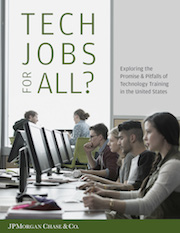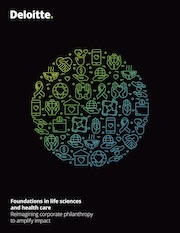Site Search
- resource provided by the Forum Network Knowledgebase.
Search Tip: Search with " " to find exact matches.

In the past few years, training programs promising on-ramps to high-paying tech jobs have sprung up across the country, drawing attention from the media, government leaders, and the general public. The rapid growth of these new models for tech training – often designed to fill the projected growth in information and communication technology (ICT) jobs – raises questions about how best to classify and understand these programs and their role and value in workforce development more generally.
This report examines the reasons for the tech training hype and proposes a taxonomy of training programs, cataloging best practices from each program type. The report also identifies challenges that organizations, employers, and the government will need to address to ensure these expanding programs accurately meet market demand and look to the future of tech training more generally.
Wells Fargo is donating $300,000 from the Wells Fargo Foundation to support three organizations providing urgent relief in Puerto Rico following Hurricane Fiona. The funding to the Hispanic Federation, SBP, and World Central Kitchen will focus on necessities like meals and supplies as well as resources for rebuilding efforts.
"We understand the urgency when natural disasters hit – especially in Puerto Rico, where communities are still recovering from Hurricane Maria," said Otis Rolley, president of the Wells Fargo Foundation and head of Philanthropy and Community Impact. "At times like this, our company supports the resilience of Puerto Rico and is quickly deploying resources to help meet the many needs unfolding in the aftermath of this storm."
OceanFirst Foundation, Toms River, has awarded $718,900 in grants to 104 New Jersey and Philadelphia nonprofits. Organizations will receive General Operating/Flexible Support Grants to help them meet organizational needs. Services include, but are not limited to, healthcare, crisis assistance, emergency response, homelessness prevention, hunger and poverty fighting programs, and job readiness services.
“Our partners are passionate about serving our neighbors, and we’re proud to present them with General Operating/Flexible Support Grants as we work together to uplift our communities,” shared Katherine Durante, executive director, OceanFirst Foundation. “Through unrestricted funding, our partners have the flexibility to adapt to evolving community needs. We are committed to empowering nonprofits and providing resources to neighborhoods served by OceanFirst Bank. I am confident that this year’s incredible grantees will make a positive and long-lasting impact.”
Every person wants to lead a safe and healthy life. We want the opportunity to fulfill our greatest potential, and to receive the support and guidance we need to travel down our own unique path. We wish this for ourselves and seek it for our children and loved ones.
In fact, communities all over the country go to great lengths to create conditions for young people to thrive. Every year, efforts to promote youth wellbeing amount to hundreds of billions of dollars in public expenditures in education, health care, community development, and related fields. Together with significant resource contributions from the philanthropic, nonprofit, academic and private sectors, these investments make clear that creating, promoting, and sustaining health and safety for young people is a national priority.
This report details how funders can embrace the power of young people to advance healthier and safer communities.

The role of corporate philanthropy is at a pivotal point as executive, employee, and customer expectations shift and stakeholders increasingly expect businesses to value and invest in societal welfare. In this rapidly evolving environment, there is opportunity for corporate foundations to reevaluate traditional approaches to grant making, social responsibility, and engagement with counterpart organizations.
The life sciences and health care industry provides an exceptionally compelling illustration of macrophilanthropic trends and possibilities. Although all industries can constructively transform existing corporate philanthropy models, the life sciences and health care ecosystem is experiencing dramatic increases in consumer engagement, perceived social responsibility, and global attention that make more thoughtful, strategic philanthropic investment especially urgent. In this paper, they examine the current health ecosystem, evolving stakeholder expectations, the unique position of life sciences and health care foundations to effect critical change,and alternative engagement models with demonstrated track records of success on an international scale.
Looking to help drive economic opportunity and upward mobility, Bank of America announced Tuesday that it will be making more than $4.2 million in grants to 75 New Jersey nonprofits.
The grants, announced during “Giving Tuesday,” will be used by groups that focus on basic needs, affordable housing, workforce development and small business and economic revitalization, Bank of America New Jersey President Alberto Garofalo said.
“As part of our commitment to sustainable growth, helping local organizations address immediate short- and long-term needs has been key on our path of economic recovery,” he said. “By supporting New Jersey’s incredible network of nonprofits, Bank of America is providing philanthropic capital to help advance economic and social progress, establishing pathways to success and stability for our community.”
